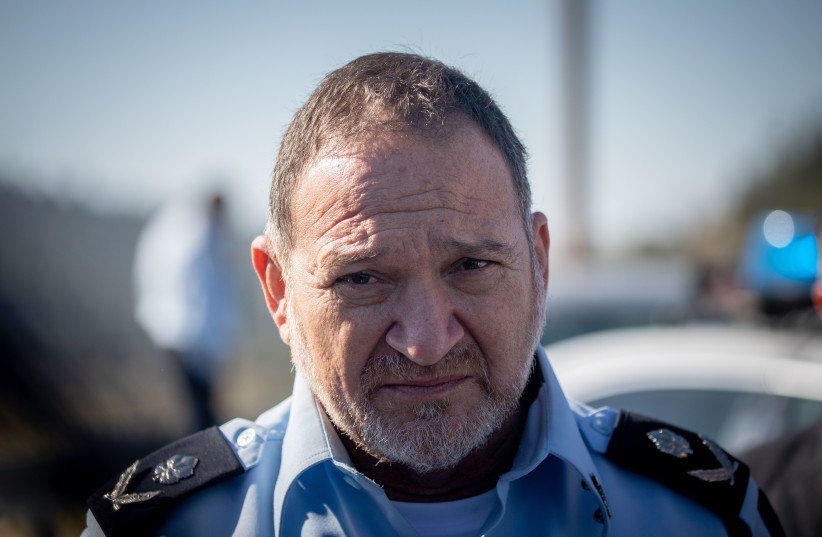Responsibility means never having to say you’re to blame.
That is what emerged from Police Insp.-Gen. Kobi Shabtai’s eagerly awaited testimony on Monday before the state commission of inquiry investigating last year’s Lag Ba’omer disaster in Meron, where 45 people were crushed to death and more than 150 injured at the tomb of Rabbi Shimon bar Yochai.
“I have responsibility for everything that happens in the Israeli police,” Shabtai said at the conclusion of his testimony, where he shifted blame from himself to the head of Israel Police Northern District, the political echelon and engineers. “The question is whether responsibility is blame.”
With this comment, Shabtai was repeating what Amir Ohana, public security minister at the time of the tragedy, said shortly afterward in response to calls for his resignation: “I am responsible, but responsibility does not mean blame.”
In other words, responsibility means never having to say you are accountable or draw any personal conclusions. It has turned into the new Israeli mantra, one used when things turn sour.

“I’ll put things on the table: I, Shimon Lavie, commander of the Israel Police Northern District, bear full responsibility for better and worse,” Lavie said shortly after the dimensions of the disaster became known.
Lavie took responsibility, but he remains in his job nearly a year later. How? Because responsibility does not mean being held accountable.
This mantra – responsibility means never having to say you are the one to blame – conjures up famous words spoken by the actress Ali MacGraw in the gushy 1970 hit movie Love Story: “Love means never having to say you’re sorry.”
Both lines are vacuous. Just as MacGraw admitted in interviews since that movie was made that the line was “rubbish,” so, too, should Israel’s leaders admit that there is no such thing as responsibility without accountability; no such thing as responsibility without drawing conclusions; no such thing as responsibility without bearing some blame.
Administrative responsibility might not mean that one should be punished for everything that goes bad in a huge organization under one’s watch; but it certainly means that one should be held accountable if something under one’s watch goes woefully wrong.
And 45 people dead at a religious ceremony – the worst civilian disaster in the history of the state – means something has gone woefully, woefully wrong. Someone was sleeping on the job.
This wasn’t a tornado or a terrorist attack. Something like this doesn’t just happen. Someone allowed too many people to go to the site; someone did not heed previous warnings; someone did not enforce the regulations; someone pushed for unlimited access to a site that anyone who has ever visited realizes cannot accommodate unlimited numbers of people; someone was unable to stand up to strong interest groups. And a failure of this magnitude has many fathers, not just one.
The problem is that none of those fathers have been willing to say: “I messed up, and am leaving.”
Why is that necessary? Not to fill any primal urge to punish, but rather because it creates a culture of accountability, and sends a message to those in public roles in the future: if you want the job that comes with perks such as power, prestige and high salaries, then when something bad happens, you can’t say, as Shabtai did: “The failure begins with an engineering failure.”
In response to the panel’s question on whether he knew about the engineering problem on the narrow walkway where the people were crushed, Shabtai replied, “I’m not a safety engineer.”
True. But that’s no answer. Shabtai’s responsibility is to ensure that there are safety engineers who have verified that the site could hold the crush of people who go there every year.
No one forced Shabtai to become police commissioner. He wanted it. So it is difficult to hear him say that bad engineering was to blame, or Lavie was to blame, or the political echelon was to blame.
As head of the police, as the one responsible for ensuring that a site is safe enough to accommodate tens of thousands of visitors, then considering the safety of the walkway where people were trampled is something that falls under his jurisdiction.
It is now just a few weeks shy of a year since the Meron disaster, and no one has paid any professional price for what happened.
Let that sink in.
When the top police officers get together in a few weeks to go over the plans for this year’s Lag Ba’omer celebration at Meron, almost all the same senior officers who approved last year’s plans will be sitting around the table – including Shabtai and Lavie.
There is definitely something wrong about that picture.
That no one yet has had to step down not only sends a chilling message to the families of the victims, but it also sends a negative message to the nation: when the country’s leaders blunder badly, don’t worry, there will be no price to pay.
In this country, where there are so many life-and-death issues and instances being dealt with every day, that is worrisome. As hard as it may sound, heads sometimes need to roll for even unintentional mistakes and oversights. Not, again, out of a desire to punish, but rather to send the message to others that vigilance and diligence are demanded of those holding this country’s most sensitive positions.
Those who do not learn from their mistakes are bound to repeat them. If there is no culture of accountability, if there is no price for major mistakes that cost dozens of lives, there is no incentive for anyone to learn anything from them.
